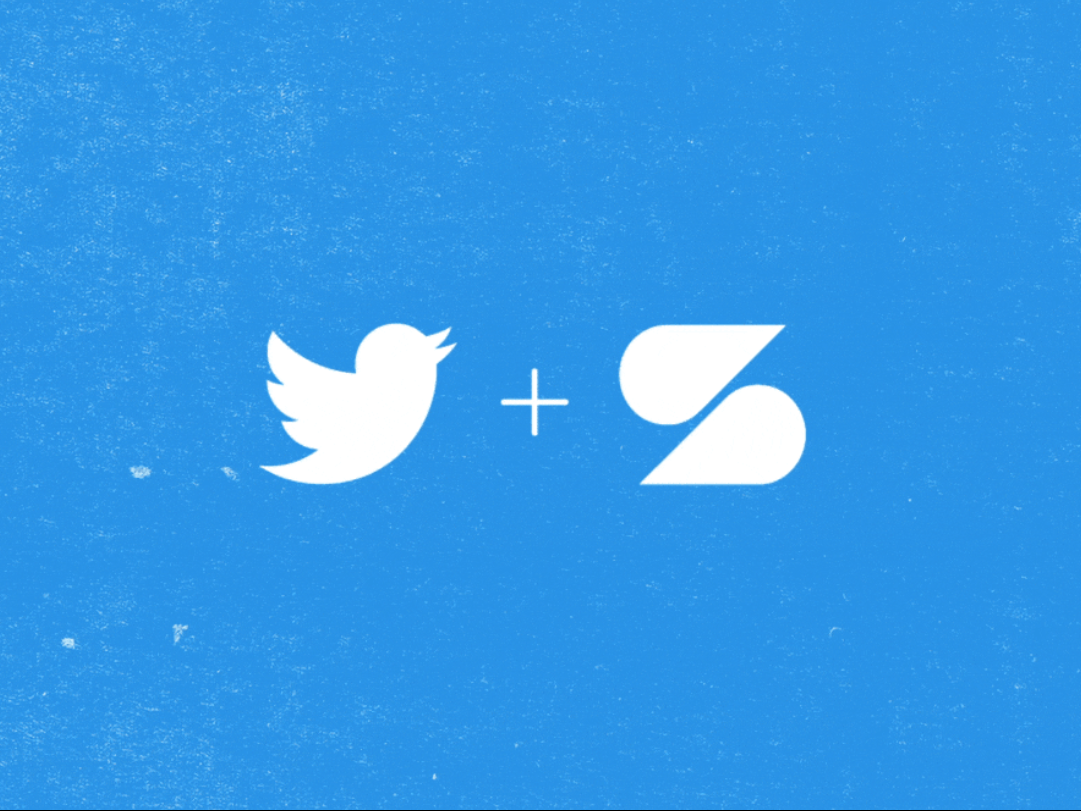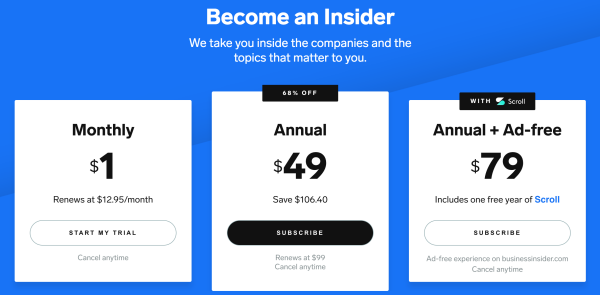
Twitter this week announced it was buying Scroll, an ad-blocking subscription service that shares its revenues with publishers.
The start-up, which launched its product in the US in January 2020, already works with large media companies including Insider, Buzzfeed, USA Today, Vox, the Philadelphia Inquirer and the Atlantic.
To date, the very largest publishers have not signed up to partner Scroll. But its new association with Twitter means all news businesses, large and small, will need to keep an eye on the platform.
Here, in the latest edition of Press Gazette’s Platform Profile series, we take a closer look at Scroll, analysing the pros and cons of working with the platform for publishers. We have previously profiled platforms including Clubhouse, TikTok, Acast, Authory, Apple News+ and Facebook News.
Although Scroll says its reader revenues can outweigh ad losses, some larger publishers may feel they can earn more through advertising. Scroll is not yet a well-known brand among consumers. Uncertain how Scroll will change after Twitter takeover and how relationship with the social media giant will work.
What is Scroll?
Led by entrepreneur Tony Haile (formerly of analytics firm Chartbeat), Scroll launched its ad-blocking subscription product in January 2020.
For $4.99 a month, subscribers can access hundreds of news websites without being subjected to clunky adverts and pop-ups.
This payment is divided between Scroll, which takes around 30%, and publishers (see below for details on how the money is distributed).
As of now, Scroll has hundreds of publishing partners. The majority appear to be specialist sports websites (see full list here). But Scroll has built up an impressive collection of high-profile US news partners, including Insider, Buzzfeed, The Atlantic, USA Today and Vox.
Scroll does not give readers access to paywalled websites. Instead, subscribers are offered an ad-free experience on news sites to which they already subscribe.
However, Insider recently began selling subscriptions with Scroll technology included (more details below).
Show me the money
Ad-blocking has long been a controversial phrase in publishing circles. If readers block news websites from serving them adverts, the publisher misses out on marketing revenues.
But Scroll is different from other ad-blockers because it works with publishers, and shares out its subscription revenues.
How does it work?
Scroll says that publishers are paid up to 70% of the $4.99 monthly subscription payment.
The money is divided up according to how long users spend on different websites through Scroll (as demonstrated in the tweet/ image below).
My favorite little thing about @tryscroll is seeing where my money goes each month: pic.twitter.com/lFlRPo88Mb
— Tony Haile (@arctictony) January 22, 2020
Insider COO: ‘The economics work’
Insider, formerly known as Business Insider, was one of Scroll’s early publishing partners.
Despite already having a paywalled website, the publisher has found that there are readers who are willing to pay for subscriptions to both Insider and to Scroll.
The scale of interest is significant enough that Insider now offers an ad-free subscription using Scroll technology (pictured below).

Claudius Senst, Insider’s chief operating officer, tells Press Gazette: “Ad-blocking is destructive to the publishing ecosystem. Scroll creates the possibility of finding a solution for people who are definitely not interested in seeing advertising. With Scroll, we are in a position where we stay in control and are able to satisfy our underlying economics.”
Asked what the negatives of working with the platform are, he says: “I don’t see any cons of working with Scroll. What Scroll provides to publishers is a solution where they stay in control and where they can basically decide what user experience they want to create, and how they want to monetise their content. What we saw very early on was very encouraging.
“I think the hypothesis from Scroll is definitely holding up. If people actually have the ability to choose to not see ads, there might still be a path to creating a fair value exchange between publishers and readers, which is not linked to a premium subscription service.”
He says: “The reason why we are so excited about this is that the economics work. And also the scale of Twitter will certainly help to accelerate the development there. We believe in the hypothesis, and we see that the hypothesis is driving results here.”
Senst adds, though, that Insider is not against advertising. “On the contrary, we want to get to a solution that provides us with the ability to grow our newsroom and our journalistic capabilities. And we don’t mind whether it’s financed by advertisers, whether it’s financed by readers, or whether it’s financed by readers who are paying in exchange for not seeing ads.”
Why are some other large US news brands not on board?
For a media start-up, landing partnership deals with the likes of Insider, USA Today and Buzzfeed is impressive.
But it is notable that the very largest US news brands – the New York Times, Wall Street Journal, Washington Post, CNN and Fox News to name a few – do not currently work with Scroll.
Why?
One senior publishing source described Scroll, pre-Twitter deal, as “meh”. The platform’s offering did not seem financially significant – larger news brands can command larger advertising fees – there was little appeal attached to the brand, and a partnership was not deemed to be worth the time and effort.
They added, though, that Twitter brings some “heft” to Scroll and large publishers will now be watching the company more closely.
What does the Twitter deal mean for Scroll?
It is not clear at this stage what the Twitter takeover will mean for Scroll and its publishing partners.
A Twitter spokesperson said that Scroll “will continue to support existing subscribers and publishers” but is “temporarily pausing any new sign-ups for now so we can focus on including their product in our subscription plans and prepare to grow Scroll’s publisher network. Any new publishers interested in joining can sign up on Scroll’s website for the latest updates.”
Publishers will be intrigued to find out how Scroll fits into Twitter’s plans to enter the subscriptions business.
The social media giant bought newsletter platform Revue earlier this year, and also revealed plans for a new “super follow” feature, which could enable users to charge for content.
In a blog announcing its Twitter deal on Tuesday, Scroll said: “Twitter’s ambitions are larger than people suspect. The burst of innovation and activity we are now seeing is the output of a team that are thoughtfully, methodically putting together the capabilities to meet those ambitions.”
The verdict
Even before its tie-up with Twitter, many large publishers would have been keeping an eye on Scroll.
Built on a good idea and led by an experienced media executive, it had signed up an impressive group of partners. Its Insider subscription deal, announced last month, showed that Scroll was working for publishers.
Now, in the aftermath of the Twitter deal, the publishing industry’s focus on Scroll will intensify.
At this stage, it is nowhere near being a must-be-on service for news websites. But Twitter has made Scroll a must-watch platform for publishers.
Email pged@pressgazette.co.uk to point out mistakes, provide story tips or send in a letter for publication on our "Letters Page" blog
